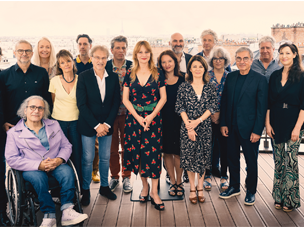Jean-Noël Tronc, CEO

Culture, the first sector to be locked down, has been gradually reopening up since the end of May, fifteen months after its brutal shutdown. But even though we are brushing up against the hope of a return to "normal," hardship and uncertainty still prevail today.
For authors, composers and publishers, this crisis has been particularly harsh, underscoring once again the extreme fragility of their situation and their status. Very early on, Sacem took the measure of what it meant for them: a dreadful double blow of income loss. At first it was brutal and immediate, as commissions and artistic projects stopped, but it would also prove to be long-lasting, since royalties are, by nature, paid with a delay. This crisis is the worst that our society has experienced in 170 years. It hit our members, our partners, and many of our customers who use music, as well as Sacem itself. As we had anticipated, after eight years of continuous growth, authors' rights collected suffered a historic decline of nearly 12% for 2020 alone, representing a loss of 131 million euros. Rights from concerts, tours, festivals or soundtracks were, unsurprisingly, the most affected with a collapse of almost 50%. Only collections of Internet rights rose sharply, illustrating the preponderant place digital technology now has in music usage and the acceleration of trends that were already present. Consequently, this sharp drop in fees collected had a significant impact on our management account, with an expected cumulative deficit (2020-2021) of approximately -20%.
Faced with the seriousness of the crisis, we had to implement a major cost savings plan. We are very proud of the fact that, in 2020 and 2021, we will not be asking our members, who have been hit so hard in terms of income, to make any additional effort.
Sacem was able to make very significant savings, amounting to 28 million euros for 2020, associated with a significant reduction in our workforce. At the same time, we were able to prove the strength of our model by committing ourselves to securing the distribution of authors' rights, setting up a raft of emergency measures on an unprecedented scale, creating a specific remuneration system for livestreams and initiating a surge of solidarity for the French music scene. Collectively, along with the professional organisations, we also worked to obtain aid and support mechanisms for authors, composers and publishers from the State and the National Music Centre. At the European level, we cultivated a constructive dialogue with the European Commission.
At the same time, aware of our major responsibility towards our members, and confident in our ability to emerge stronger from this crisis, we launched a transformation plan to accelerate the implementation of our development strategy. It has already resulted in the launching of new services for our members: supplementary health insurance for all; the Sacem Plus platform which, among other things, connects our members and our clients; and, as part of the new online membership, a reduction in fees by one third to 100 euros for authors and composers and 300 euros for publishers. At a time when studies show the seriousness of youth impoverishment as a result of the Covid crisis, this is a strong and concrete gesture of commitment.
Along with all of this, at the very moment when the cultural community could see the light at the end of the tunnel, we had to wage an intense battle for a resource vital to culture: remuneration for private copying, which was threatened in the framework of the law on the environmental footprint of digital technology. Inherited from a founding law from 1985, private copy levies are a special mechanism to fairly compensate rights holders for the transfer of the value generated by cultural works to our telephones and other media. It means a right to copy for consumers, a right to make profits for smartphone and tablet manufacturers and legitimate compensation for all cultural sectors. Our collective mobilisation was taken on board by the French Parliament which, instead of voting for a provision aiming at exempting reconditioned phones, decided to adopt a balanced compromise at the end of a lively parliamentary debate. As was the case for the Copyright Directive, whose transposition into French law was welcomed last month, this new battle reminded us how vital it is to fight for authors' rights, and for collective management.
As the summer period approached, Sacem made new commitments to support its members and clients and to ensure that the resumption of musical and cultural activities was a success. It is strengthening the emergency fund and extending the remuneration of livestreams. With a financial support programme called "Tous en live", Sacem is also working alongside music users, cafés, hotels, restaurants, nightclubs, etc., to help them reconnect with their customers while contributing to the revival of music and live performance.
Published September 27 2021


